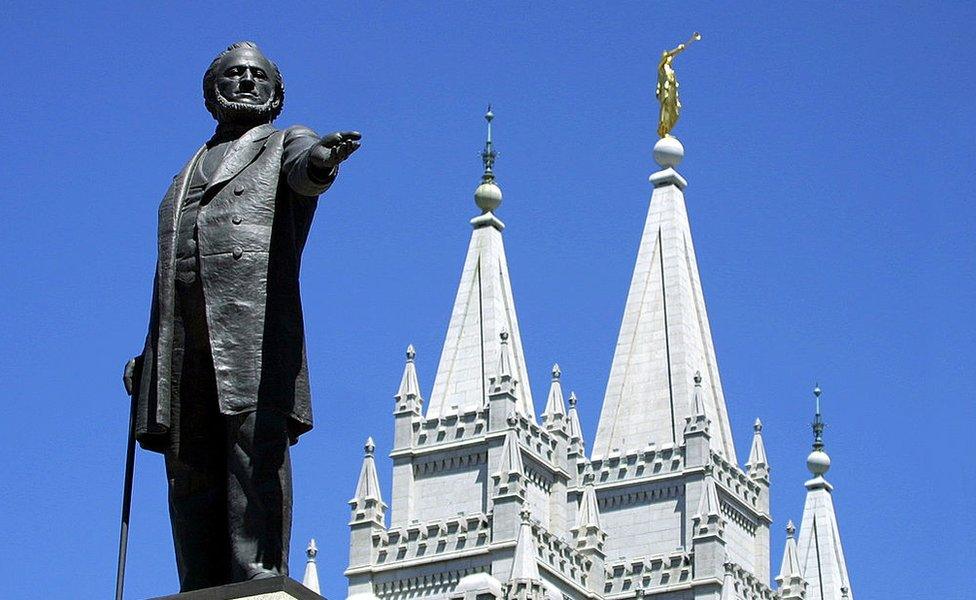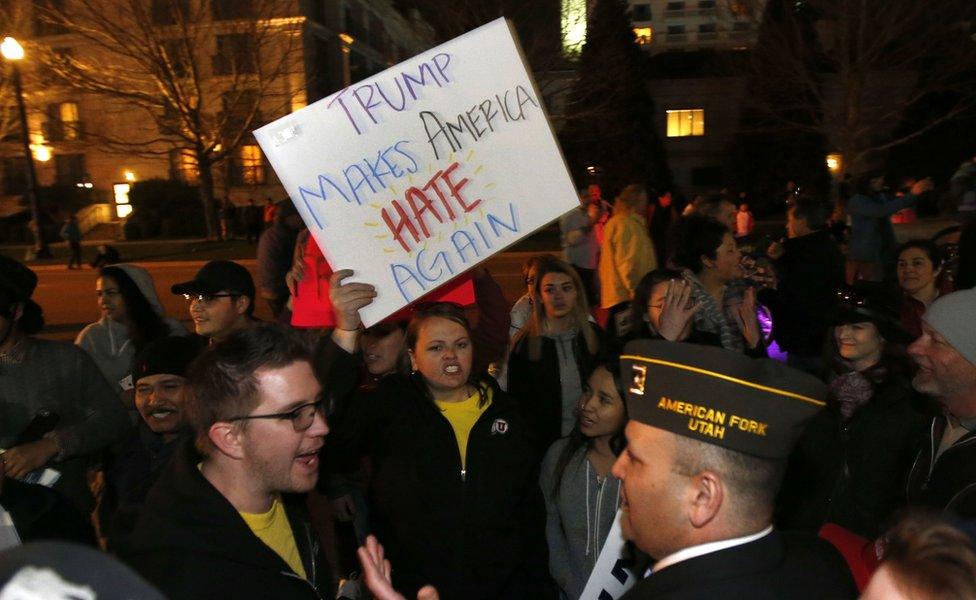US Election 2016: Donald Trump struggles to win over Mormons
- Published

Polls in Utah - the heart of the Mormon church in the US - show Mr Trump trailing Texas Senator Ted Cruz
US presidential candidate Donald Trump has won over large blocs of religious voters, but one group of faithful conservatives has resisted - Mormons.
He lost contests in Idaho and Wyoming, which have large Mormon populations, and polls show him a distant second in Utah, where the church is based.
Tuesday's Republican caucuses in Utah could signal a weakness for Mr Trump.
Some early polls show that if Mr Trump advances to the general election, Utah voters would choose a Democrat.
The last time the state voted for a Democrat in a presidential election was 1964.
A win in Utah by Hillary Clinton or Bernie Sanders - the two battle in the state's Democratic caucuses on Tuesday - would represent a major shift in the typically static electoral map.
Also on Tuesday, Democrats will vote in Idaho while both parties are holding a primary races in Arizona.
One of the most prominent Mormons in the US, former Massachusetts Governor Mitt Romney, has recently led the charge against the Republican front-runner.
Mr Romney, who was the last Republican presidential nominee, has condemned the New York businessman, saying Mr Trump's campaign has become associated with "racism, misogyny, bigotry, xenophobia, vulgarity and, most recently, threats and violence".
The Romney-Trump bromance turned sour
Other religious groups have criticised Mr Trump's campaign rhetoric. This week a group of rabbis protested his speech to an American-Israeli lobbying group in Washington.
In February, Pope Francis expressed concerns about Mr Trump's plans to build a wall between the US and Mexico.
But these condemnations of have done little to halt the Trump campaign's momentum.
Election results and polling data have shown the candidate is extremely popular with working-class Catholics and evangelical Christians.
Founded in 1830, Church of Jesus Christ of Latter-day Saints is the fourth largest religious group in the US and has throughout much of its history been associated with the Republican Party.
In recent years the church's membership has grown globally with 8 million of its 15 million followers living outside US.

More on the US presidential race

A Trump rally in Salt Lake City attracted a large number of protesters
Jorge Ramos on Donald Trump's rise - Meet the Republican front-runner's nemesis
Who is funding the US election? - Money is a big issue in the 2016 US presidential race
Could Hillary Clinton face jail time? - The case of David Petraeus may signal how she will fare

It has a growing presence in Mexico, which Mr Trump has accused of sending criminals into the US and encouraging illegal immigration.
Unlike Mr Trump, the church has generally been supportive of immigration and the rights of immigrants.
Also, Mormons, once persecuted as a religious minority, have been unsettled by his plan to ban Muslims from entering the US.
"The Church of Jesus Christ of Latter-day Saints is neutral in regard to party politics and election campaigns," the church said in a statement after Mr Trump first proposed the ban in December. "However, it is not neutral in relation to religious freedom."
The statement went on to cite the founder of Mormonism, Joseph Smith, who preached respect for other religions.
While other US governors sought to block Syrian refugees from their states in late 2015, Utah Governor Gary Herbert welcomed them.
McKay Coppins, a reporter for BuzzFeed who is Mormon, has written extensively about Mr Trump's problems with Mormon voters, external.
"His blatant religious illiteracy, his penchant for onstage cursing, his habit of flinging crude insults at women, his less-than-virtuous personal life and widely chronicled marital failures — all of this is anathema to the wholesome, family-first lifestyle that Mormonism promotes," Mr Coppins wrote.